¡Hablamos Español!
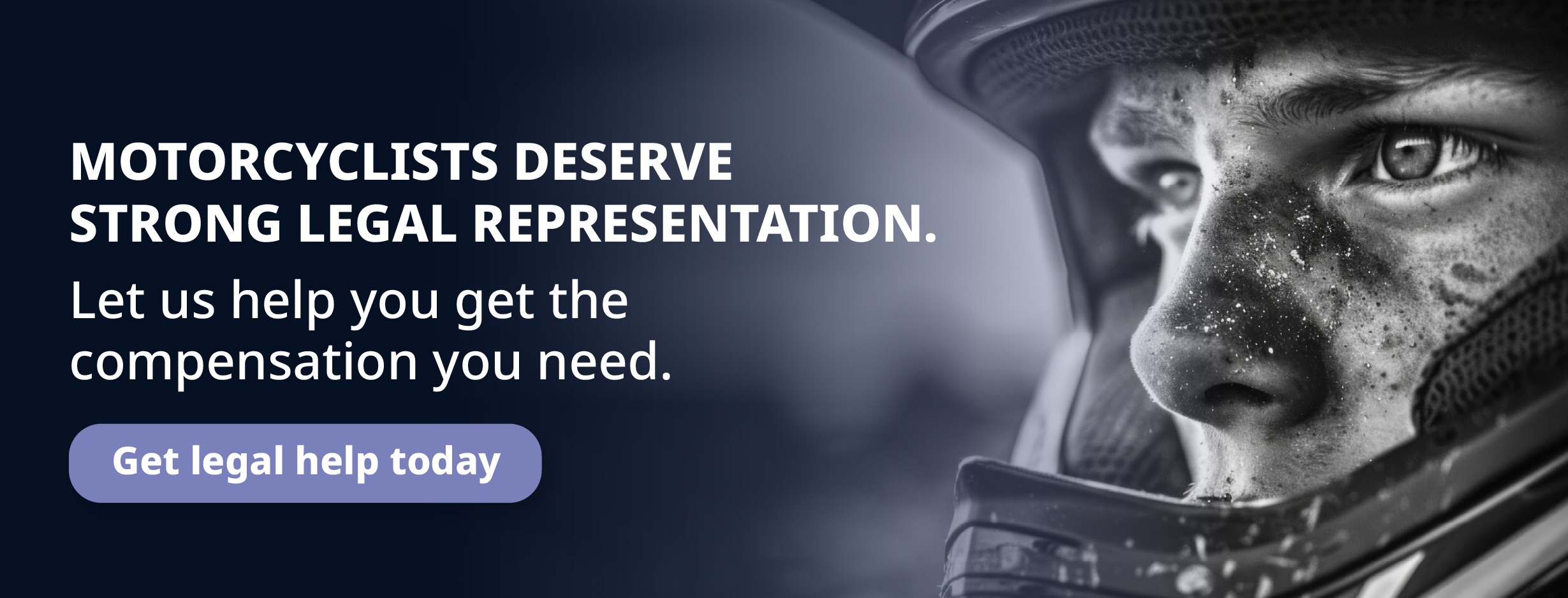
Motorcycle accidents can leave riders facing serious injuries, financial strain, and uncertainty about the future. At Flickinger Boulton Robson Weeks, our Utah motorcycle accident lawyers understand motorcyclists’ unique challenges after a crash.
From dealing with insurance companies that often try to shift blame onto riders to fighting for the full compensation you deserve, our experienced legal team is here to protect your rights.
Whether your accident was caused by a reckless driver, hazardous road conditions, or another party’s negligence, we are committed to helping you recover physically, financially, and emotionally. Let us take on the legal battle while you focus on healing. Contact a Utah motorcycle accident lawyer today for a free consultation.
Motorcycle accidents are a major concern in Utah, with recent trends highlighting the need for increased awareness and safety measures. In 2024, the state experienced a 15-year high in motorcycle-related fatalities, underscoring the urgency of addressing this issue.
According to preliminary data from the Utah Department of Transportation and Department of Public Safety, 281 people were killed on Utah roads in 2024, a slight increase from 279 in 2023. Notably, motorcycle fatalities reached 53, marking a 15-year high.
Several factors contribute to the high rate of motorcycle accidents in Utah:
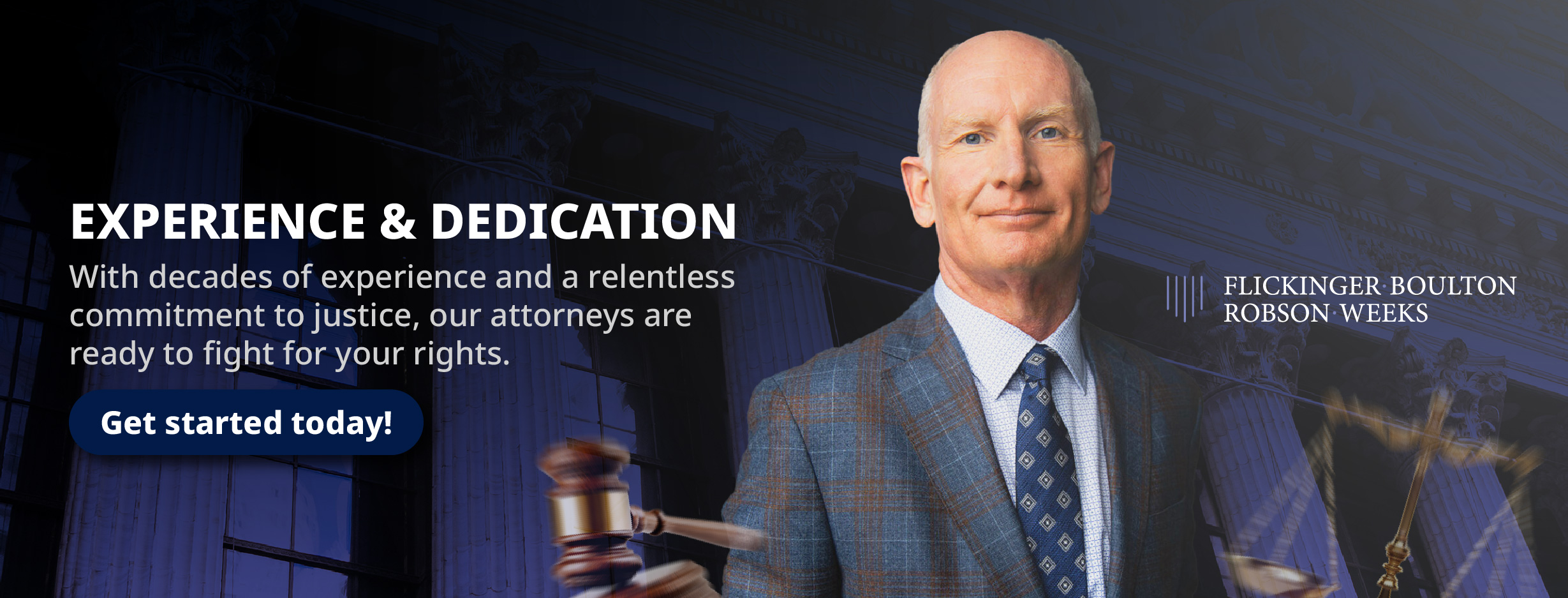
Motorcycle accidents can happen for various reasons, often resulting in severe injuries due to the lack of protection compared to cars and trucks. Understanding Utah’s most common causes of motorcycle accidents can help riders stay vigilant and take preventive measures to reduce their risks.
One of the most frequent causes of motorcycle accidents in Utah occurs when a car makes a left-hand turn in front of an oncoming motorcycle. These collisions often happen at intersections when drivers misjudge a motorcycle’s speed or fail to see it altogether.
Since motorcycles are smaller than other vehicles, they can easily end up in a driver’s blind spot, making them more vulnerable to these types of accidents.
Motorcycles can be difficult for other drivers to see, especially when a car or truck is switching lanes. A driver who fails to check their blind spots or use turn signals may inadvertently collide with a motorcycle. This type of accident is hazardous on highways, where higher speeds increase the severity of the impact.
By either the motorcyclist or other drivers, excessive speed significantly increases the risk of accidents. Speeding reduces reaction time and makes it harder to control a motorcycle or avoid unexpected obstacles. Reckless driving, including weaving between lanes, tailgating, and aggressive maneuvers, further raises the likelihood of crashes.
With the rise of smartphones, distracted driving has become a leading cause of all types of accidents, including those involving motorcycles.
Drivers who text, talk on the phone or adjust their GPS while driving may not notice a nearby motorcycle. Because motorcycles are smaller than cars, they are even more susceptible to being overlooked by distracted drivers.
Driving under the influence of alcohol or drugs is a major contributor to motorcycle accidents. Impaired drivers have slower reaction times, poor judgment, and difficulty maintaining control of their vehicles, making them highly dangerous to motorcyclists. Likewise, motorcyclists who ride while intoxicated face an even greater risk of losing control and crashing.
Uneven pavement, potholes, gravel, and debris can be particularly hazardous for motorcycles, which are more sensitive to road imperfections than larger vehicles. Wet or icy roads, poor lighting, and construction zones further increase the danger, making it essential for riders to stay alert and adapt to changing conditions.
A lesser-known but still dangerous cause of motorcycle accidents is “dooring,” which occurs when a driver or passenger in a parked car opens their door without checking for oncoming motorcycles. When this happens, a motorcyclist may crash into the open door, resulting in severe injuries.
A poorly maintained motorcycle can experience mechanical failures, such as brake malfunctions, tire blowouts, or engine problems, leading to serious accidents. Regular maintenance and pre-ride inspections are crucial to ensuring a motorcycle is working safely.
If you or a loved one has been injured in a motorcycle accident in Utah, seeking legal assistance from a Utah motorcycle accident lawyer can help protect your rights.
While some accidents are unavoidable, riders can take several precautions to minimize their risk:
In 2021, Utah reported 61,406 motor vehicle accidents, resulting in numerous injuries and fatalities.
Enhancing riding skills through formal training can significantly reduce accident risks.
Anticipate potential hazards and maintain a safe distance from other vehicles.
Adherence to speed limits and traffic signals is crucial for safety.
Wearing brightly colored clothing and using headlights during the day can help other drivers see motorcyclists more easily.
Ensuring that the motorcycle is in good working condition can prevent mechanical failures that might lead to accidents.
By understanding the factors contributing to motorcycle accidents and implementing effective safety measures, riders can significantly reduce their risk and promote safer roadways in Utah.
Utah’s motorcycle laws and regulations are designed to promote safety and ensure that motorcyclists operate their vehicles responsibly. Understanding these laws is crucial for residents and visitors wishing to ride motorcycles within the state.
One of our experienced Utah motorcycle accident lawyers can help determine if any of the following legal violations contributed to your accident and how that may impact your claim:
In Utah, helmet use is mandatory for all motorcycle operators and passengers under the age of 21. The helmets must meet or exceed the standards set by the Department of Transportation.
While riders aged 21 and over are not legally required to wear helmets, it is strongly recommended, as helmets have been shown to reduce the risk of fatal injuries by 37% and head injuries by 69% in the event of a crash.
To legally operate a motorcycle in Utah, individuals must obtain a motorcycle endorsement on their driver’s license. The process involves:
Alternatively, completing a state-approved motorcycle safety course can waive the skills test requirement. Riders under 19 must hold a learner’s permit for at least two months before obtaining a full endorsement.
Utah law mandates that all motor vehicles, including motorcycles, carry liability insurance with minimum coverage levels of:
Failure to maintain proper insurance can result in fines and suspension of riding privileges.
Motorcyclists in Utah must adhere to general traffic laws applicable to all vehicles, with additional regulations specific to motorcycles:
Motorcycles are entitled to the full use of a lane. Riding between lanes of traffic (lane splitting) is prohibited. However, lane filtering, passing between stopped vehicles, is permitted under specific conditions:
Riders must signal their intention to turn or change lanes at least two seconds before the maneuver.
Carrying passengers is only allowed if the motorcycle is designed for more than one person and equipped with a permanent and regular seat and footrests for the passenger.
Operators must not carry any package or item that prevents them from keeping both hands on the handlebars.
The handlebars on a motorcycle are limited to shoulder height; handgrips can be a maximum of 15 inches above the seat.
Additional Considerations
By familiarizing themselves with and adhering to these laws and regulations, motorcyclists can contribute to safer roadways and enhance their own safety while riding in Utah.
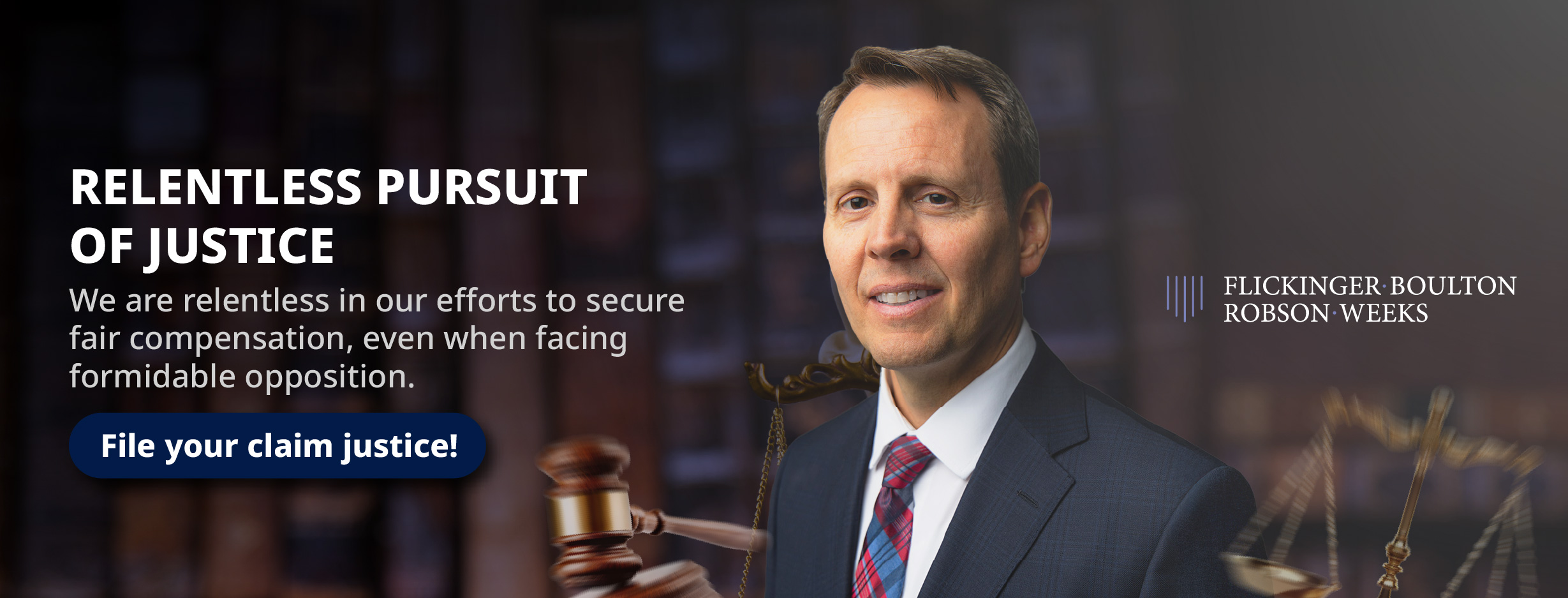
Establishing liability in a motorcycle accident is crucial for securing compensation for injuries and damages. Unlike car accidents, motorcycle crashes often involve unique challenges due to biases against motorcyclists and the severity of injuries sustained.
Understanding how liability is determined can help injured riders build a strong case.
To establish fault, various factors must be considered, including traffic laws, witness statements, and accident scene evidence. Some of the most important elements include:
Several common accident scenarios can help determine liability:
These occur when a vehicle makes a left-hand turn in front of a motorcycle, failing to yield the right of way. In most cases, the turning driver is held responsible.
If a driver merges into a motorcycle without checking their blind spots, they may be considered negligent.
If a car strikes a motorcycle from behind, the driver of the vehicle is usually at fault due to following too closely.
Utah allows lane filtering under certain conditions, but if an accident occurs, liability may depend on whether the motorcyclist followed legal guidelines.
Establishing liability requires strong evidence, which can include:
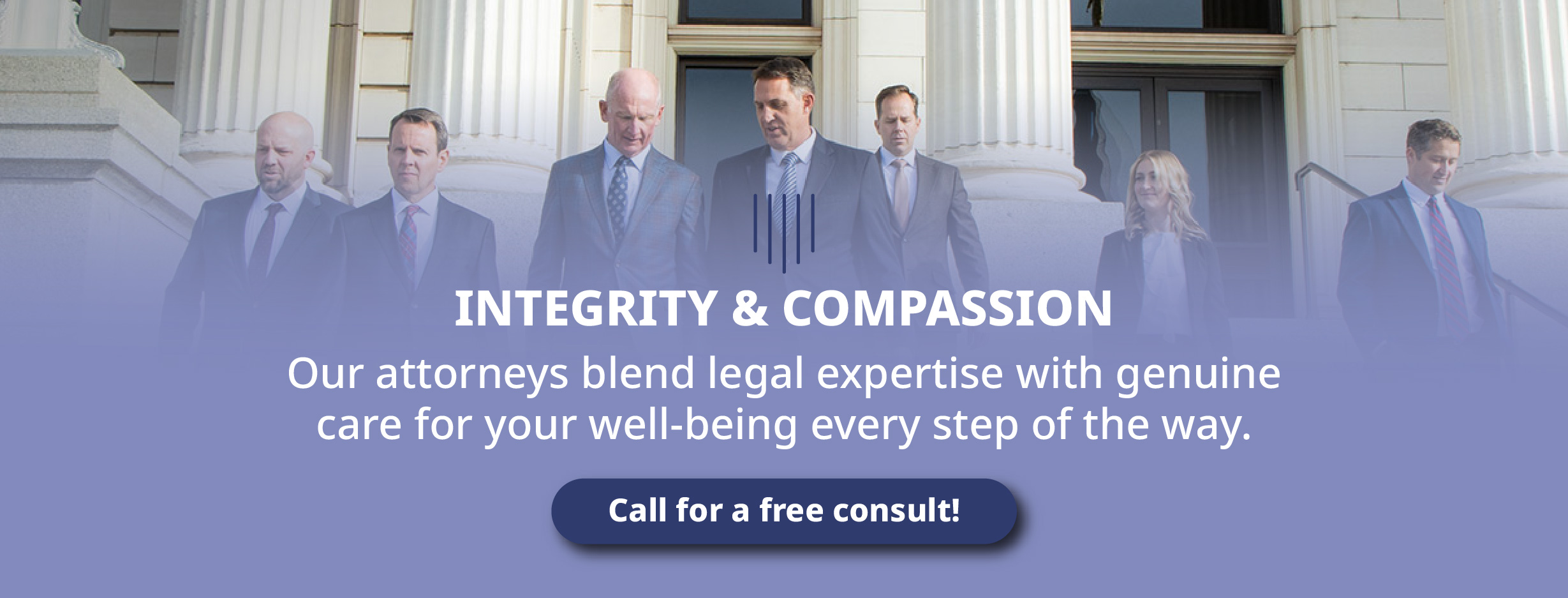
Utah follows a modified comparative fault rule, meaning a motorcyclist can recover damages as long as they are less than 50% responsible for the accident. However, their compensation is reduced by their percentage of fault. For example, if a rider is found 20% at fault for speeding, their settlement would be reduced by 20%.
By gathering the right evidence and understanding how fault is determined, injured motorcyclists can strengthen their claims and seek the compensation they deserve.
A motorcycle accident can be a traumatic experience, often resulting in serious injuries and significant property damage. Knowing what steps to take immediately after the crash can help protect your health, legal rights, and ability to recover compensation.
Your health is the top priority after an accident. Even if you feel fine, some injuries, like internal bleeding or concussions, may not be immediately apparent. Seek emergency medical care or schedule a doctor’s visit as soon as possible to document your injuries.
If you are able to do so without worsening your injuries, move yourself and your motorcycle out of traffic to prevent further harm. Turn on your hazard lights or use flares if available to alert other drivers.
Always contact law enforcement after a motorcycle accident, no matter how minor it seems. A police report can serve as critical evidence when determining fault. When speaking to the officer, stick to the facts and avoid admitting fault, as the investigation determines liability later.
If you are physically able, collect as much evidence as possible. This can help strengthen your insurance claim or legal case.
Even if you think you contributed to the accident, avoid apologizing or making statements that could be interpreted as an admission of fault. Liability is determined based on evidence and legal analysis.
Report the accident to your insurance provider as soon as possible, providing only the necessary details. Avoid giving recorded statements until you’ve consulted a lawyer, as insurers may try to minimize your claim.
Maintain all medical records, bills, and receipts related to your treatment. Document how your injuries affect your daily life, including lost wages and pain levels.
An experienced motorcycle accident lawyer in Utah can help protect your rights, handle negotiations with insurance companies, and ensure you receive fair compensation. Legal representation is significant in cases involving serious injuries, disputed liability, or denied claims.
Taking these steps after a motorcycle accident can make a significant difference in your recovery and ability to secure financial compensation.
Motorcycle accidents often result in severe injuries, significant financial burdens, and long-term physical and emotional consequences. Victims of motorcycle accidents in Utah may be entitled to various forms of compensation, depending on the circumstances of the accident and the extent of their injuries. A Utah Motorcycle Accident Lawyer can help you understand your rights and pursue the compensation you deserve for medical bills, lost wages, pain and suffering, and more.
Understanding the types of damages available can help injured motorcyclists seek the financial relief they need to recover.
Victims of motorcycle accidents in Utah may be entitled to various forms of compensation.
Economic damages cover the tangible, out-of-pocket expenses that result from a motorcycle accident. These damages are typically easier to calculate because they have a clear financial value.
Non-economic damages are more subjective and compensate victims for the emotional and psychological effects of a motorcycle accident.
Punitive damages are not awarded in every case but may apply in situations where the at-fault party’s actions were particularly reckless or malicious.
These damages are intended to punish the responsible party and deter similar negligent behavior in the future. For example, if a driver was intoxicated, excessively speeding, or engaged in road rage, the court may award punitive damages.
If a motorcycle accident results in a fatality, the victim’s surviving family members may be eligible for wrongful death compensation. These damages can help cover the following:
To ensure full and fair compensation, motorcycle accident victims should take the following steps:
Motorcycle accident victims should not have to bear the financial and emotional burden of someone else’s negligence. By pursuing all available forms of compensation, injured riders can focus on healing and rebuilding their lives.
At Flickinger Boulton Robson Weeks, we understand a motorcycle accident’s devastating impact on your life. From mounting medical bills and lost wages to dealing with uncooperative insurance companies, the aftermath of a crash can be overwhelming.
Our experienced team of Utah motorcycle accident lawyers is here to help you navigate the legal process and fight for the compensation you deserve. Below are the ways we can assist in your motorcycle accident case.
If you or a loved one has been injured in a Utah motorcycle accident, don’t navigate the legal process alone. Contact a Utah motorcycle accident lawyer today for a free consultation, and let us fight for the compensation you deserve.
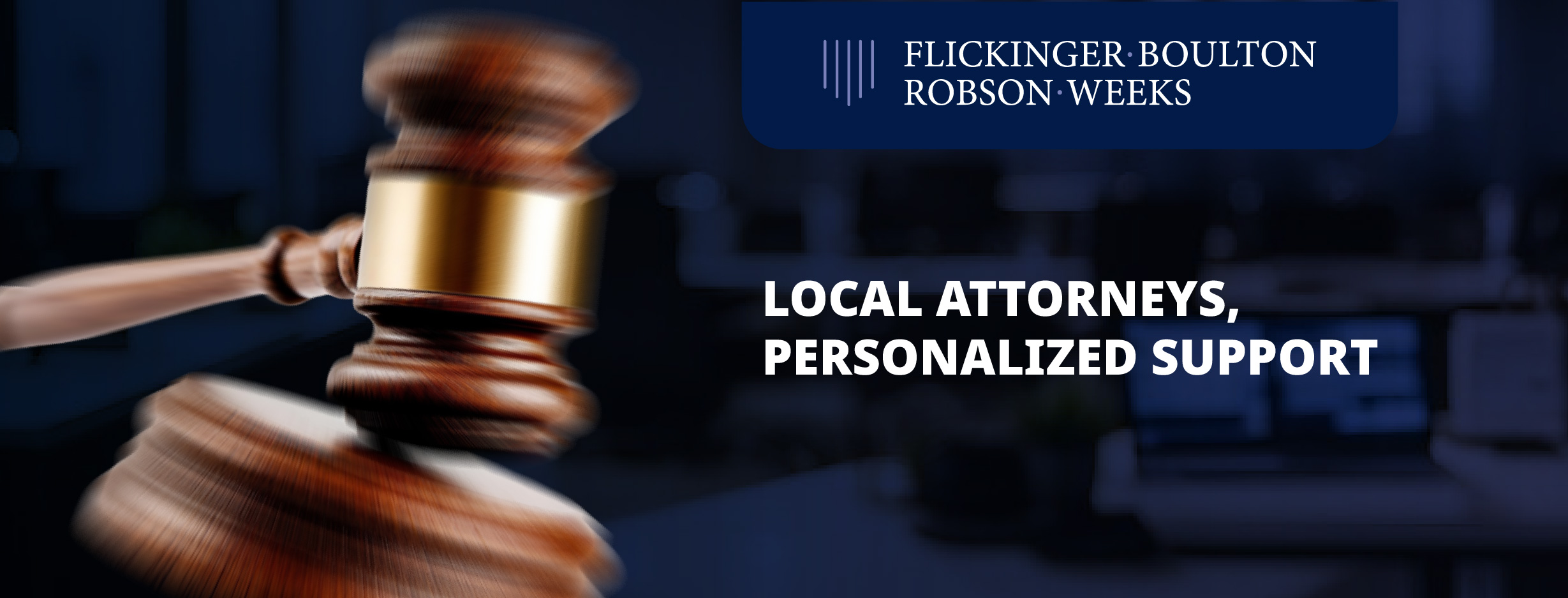
The first step in pursuing a motorcycle accident claim is understanding the full scope of your case. During your free consultation, we will:
Our goal is to provide you with honest and transparent advice so you can make informed decisions about your case.
Proving liability in a motorcycle accident case requires strong evidence. Our firm conducts a thorough investigation to build a compelling case. This may include:
Our legal team leaves no stone unturned in collecting the evidence necessary to support your claim.
Insurance companies often try to minimize payouts or deny claims altogether, especially in motorcycle accident cases where they may unfairly blame the rider. Our firm will handle all communications with insurers, ensuring that:
Your rights are protected.
You do not accept an unfair settlement.
The insurance company does not pressure you into making statements that could hurt your claim.
We negotiate aggressively on your behalf to secure the maximum compensation for your injuries, property damage, and other losses.
Many insurance adjusters and even juries hold biases against motorcyclists, assuming they are reckless or responsible for their own injuries. Our firm works to dispel these myths by presenting clear evidence proving the at-fault party’s negligence.
Whether a distracted driver caused your accident, hazardous road conditions, or a defective motorcycle part, we build a strong case to establish fault.
A motorcycle accident can result in significant financial and emotional hardships. Our legal team ensures that your claim accounts for both economic and non-economic damages, including:
We ensure you receive a fair and just settlement by thoroughly evaluating all aspects of your losses.
Many motorcycle accident claims are settled outside of court through negotiations. However, if the insurance company refuses to offer a fair settlement, we are fully prepared to take your case to trial. Our experienced litigators will:
Our willingness to go to trial often pressures insurance companies to offer better settlements.
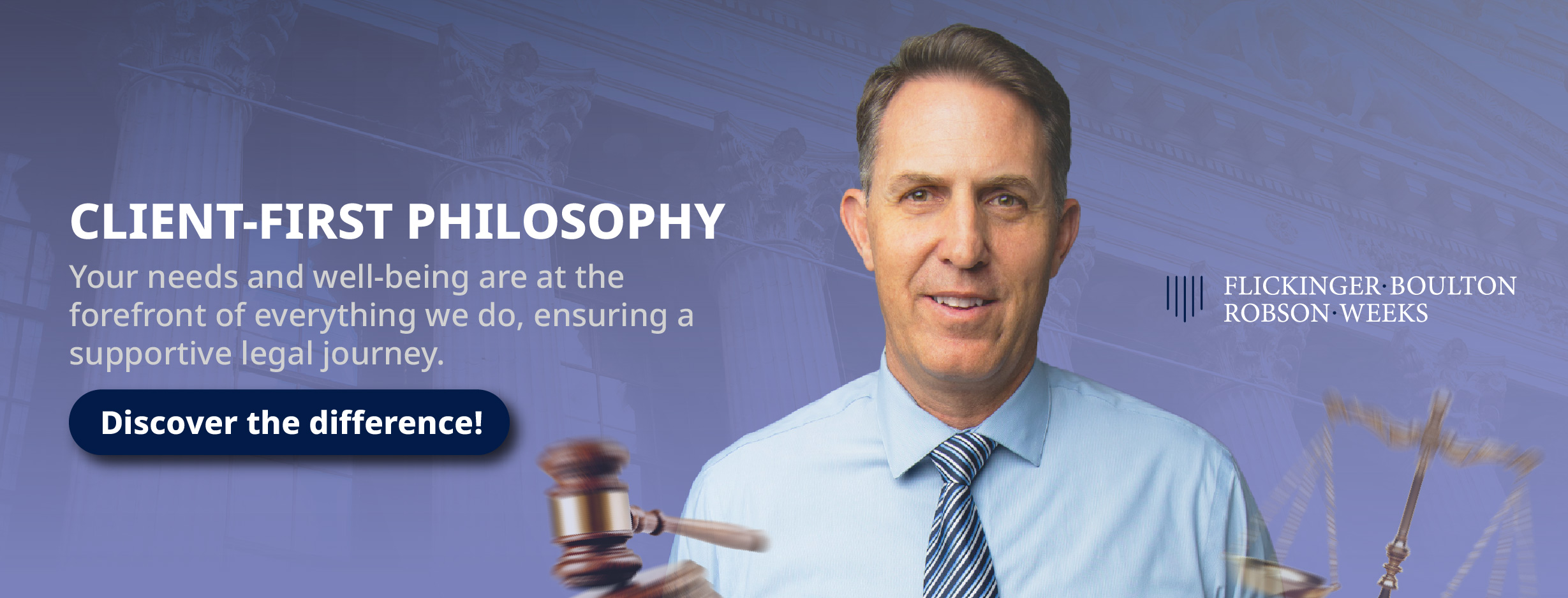
At Flickinger Boulton Robson Weeks, we treat every client like family. We understand that a motorcycle accident can be life-changing, and we are committed to:
Financial concerns should never prevent an injured motorcyclist from seeking justice. That’s why we work on a contingency fee basis, meaning you pay nothing unless we win your case. Our priority is securing the best possible outcome for you.
If you or a loved one has been injured in a motorcycle accident, don’t navigate the legal process alone. Let Flickinger Boulton Robson Weeks fight for your rights and help you secure the compensation you deserve. Contact us today for a free, no-obligation consultation with a Utah Motorcycle Accident Lawyer.
Utah is one of the few states that allows lane filtering, which permits motorcyclists to move between stopped vehicles in specific conditions. However, lane filtering is only legal when:
This law helps prevent rear-end collisions involving motorcyclists, but improper execution could still result in liability disputes.
Utah law only requires motorcyclists under 21 to wear a helmet, but not wearing one may still impact your claim. If you suffered head or neck injuries, the at-fault party’s insurance may argue that your failure to wear a helmet contributed to the severity of your injuries. However, helmet use does not affect your ability to recover damages for other injuries, such as broken bones or internal injuries.
Yes, Utah requires motorcycle insurance, but it differs slightly from car insurance. While car drivers must carry Personal Injury Protection coverage, motorcyclists are exempt from PIP requirements due to the higher risk of severe injuries. Instead, motorcyclists must have:
Since PIP is not required, motorcyclists often rely on uninsured/underinsured motorist coverage or MedPay to help cover medical expenses.
If you are hit by an uninsured driver, you may still be able to recover compensation through:
Since uninsured drivers may lack the financial resources to cover damages, it’s highly recommended that motorcyclists carry UM coverage for added protection.
Utah has a four-year statute of limitations for personal injury claims related to motorcycle accidents. However, if the accident results in a wrongful death, the deadline is reduced to two years. Missing these deadlines can prevent you from recovering compensation.
If you have more questions about your motorcycle accident case, contact Flickinger Boulton Robson Weeks today for expert legal guidance.
Even if the accident is minor, you should stop and move vehicles out of traffic. DO NOT LEAVE THE SCENE until you speak with others involved.
If you suspect someone is injured, call an ambulance. You should also call the police, even for a minor accident.
Gather CONTACT AND INSURANCE INFO from the other individuals involved in the accident. If possible, get the contact info for eyewitnesses, as well.
If it is safe to do so, TAKE PICTURES OF ALL VEHICLES INVOLVED and the accident scene. These photos can be used as evidence later.
While you should be polite, DO NOT APOLOGIZE or tell anyone it was your fault, even if you think it was. A casual apology can be seen as an admission of guilt.
DO NOT SIGN ANYTHING without discussing your case with an attorney first. Our team can protect your rights and ensure you receive a fair settlement.
Bicycle Accidents
Motorcycle Accidents
Boating Accidents
Recreational Vehicle Accidents
Bus and Mass Transit Accidents
Pedestrian Accidents
Automobile Accidents
ATV or UTV Rollovers
Commercial Vehicle Accidents
Semi Truck and Trailer Accidents
Passengers in a vehicle often sustain serious injuries in an auto accident. However, figuring out how to receive proper coverage can be difficult as the passenger.
In many cases, the driver is a family member or friend. You may hesitate to file a claim because you do not want to offend or cause trouble.
If you were injured as the passenger of a vehicle, you do not have to sue the driver, though you may have the right. You can file a claim under their insurance or the insurance of another driver involved in the accident.
At Flickinger • Boulton • Robson • Weeks, we are dedicated to helping injured individuals receive the compensation they deserve. We can help you understand your rights and determine the right course of action for your unique situation.